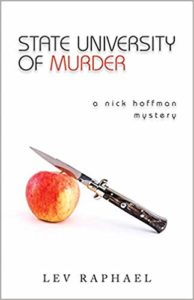Over the years and on many book tours for my mysteries, people have asked me “Is academia as vicious as all that?”
The answer is Absolutely. How do I know? Because I not only escaped that world with lots of notes, but I have many friends who are still there, reporting one fiction-worthy incident after another to me. Reality, not satire about the university, is what’s over-the-top.
I’ll start with a minor example that shows you how petty and small-minded academia can be. Back in 2011, I was invited to teach at Michigan State University’s English department, where I had earned my PhD years before. The current chair had realized via a news story that I had published more books than the entire creative writing faculty put together. He was impressed, and I was flattered.
When I started teaching, the office manager wouldn’t order a plastic name plate for my office door, the kind that all the faculty members had. We’re talking about something that costs just a few bucks and is recyclable, for a department with a budget well in the millions. That was as silly as it was insulting.
My mystery State University of Murder focuses on a charming but dictatorial chairman of an English Department, Napoléon Padovani, who manages to alienate almost all his colleagues in an oppression blitzkrieg. He’s a composite of department chairs I’ve heard about from across the country.
One chair had a bizarre approach to resolving a conflict between two professors: he suggested that the two of them get drunk together at the annual Christmas party and all their problems would be resolved—they would be friends forever! That’s on the ludicrous side, to be charitable.
Another held academic “cage matches.” Adjuncts competing for the possible tenure-track positions that might, just might be opening up each year had to present their work-in-progress every week (!) and put it in the best possible light and hope they might win the prize. The pressure was intense, the competition ugly and brutal. There’s a department chair I heard of who revealed personal psychological information about a professor during a department meeting while supposedly “worrying” about her mental state, totally violating that professor’s privacy.
And another chair who knew a faculty member was going to complain about his disregard for university regulations and not only tried to stop her from a formal complaint at a university committee, but sat behind her at the meeting along with one of his henchmen and muttered derisively when she read her statement.
A religious studies chairman I know of argued with a rabbi teaching in his department as an adjunct that Judaism was absolutely not a culture but could only be spoken about and taught as a religion. Their disagreement was a major reason the rabbi wasn’t rehired. I should add that the chair was not Jewish.
When my office mate at Michigan State University reported that a graduate student in the department who was a former boyfriend had burst into her apartment, knocking the door off her hinges, and roughed up her current boyfriend and threatened her, the chair did absolutely nothing.
And dispatches from a department I know report that the current atmosphere is “Stalinist.” While there’s significant disapproval of actions the chair is taking to limit academic freedom and free speech, those faculty members who disagree are afraid to speak up for fear of harassment and punishment. And the faculty listserv is now off limits to discussion of anything remotely “controversial.” Anyone stepping out of line is instantly attacked and vilified.
My Nick Hoffman series is satirical, taking real situations and people, extrapolating from them, making them more ridiculous, more threatening–but the emotional core is ultimately true. And the emotional toll this kind of rampant and widespread abuse of various kinds can take is also true.
There’s no evidence that George Bernard Shaw actually said “If you want to tell people the truth, you’d better make them laugh,” but whoever is the source, that quote has guided me through my series and will continue to do so.

